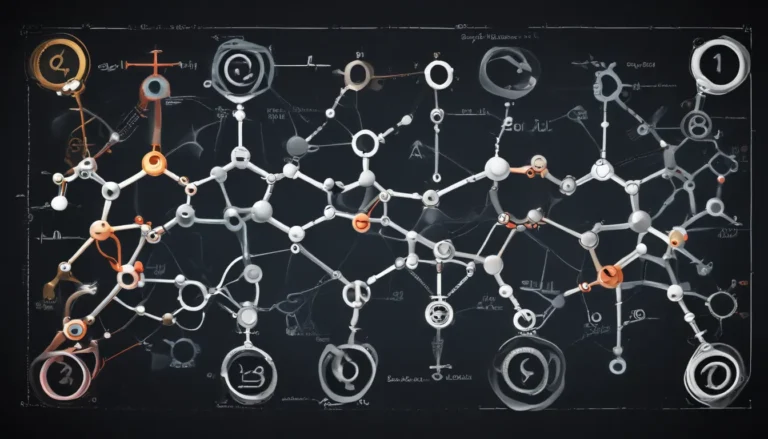A Note About Images: The images used in our articles are for illustration purposes only and may not exactly match the content. They are meant to engage readers, but the text should be relied upon for accurate information.
Are you intrigued by the secrets of life at the molecular level? Do you find the complex chemical processes within living organisms fascinating? If so, then biochemistry is the field that will captivate your imagination and expand your knowledge. By combining the principles of biology and chemistry, biochemistry unravels the inner workings of life itself, from the essential molecules to the biochemical pathways that drive cellular functions.
In this article, we will delve into the intriguing world of biochemistry and uncover eight fascinating facts that will spark your curiosity and shed light on the wonders of this captivating field of science.
The Essential Molecules of Life
At the heart of biochemistry lies the study of essential molecules that form the building blocks of life. Proteins, carbohydrates, lipids, and nucleic acids play critical roles in various biological processes and serve as the foundation of our existence. Understanding these molecules provides insights into how living organisms function at a molecular level.
The Intricate Dance of Enzymes
Enzymes are the unsung heroes of biochemistry, acting as catalysts that speed up vital biochemical reactions in our bodies. These remarkable proteins lower the activation energy required for reactions to occur, ensuring that essential processes take place efficiently. Without enzymes, many biological functions would be too slow to sustain life.
Unlocking the Genetic Code
DNA, the famous double helix structure, contains the genetic instructions that determine our physical traits and characteristics. Biochemists have made significant strides in deciphering the genetic code, leading to breakthroughs in gene therapy, genetic engineering, and personalized medicine. The study of DNA has revolutionized our understanding of heredity and disease.
Metabolism and Energy
Biochemistry sheds light on the intricate web of metabolic pathways that power our cells and provide the energy needed for life. From the breakdown of glucose to the synthesis of ATP, understanding these processes is essential for comprehending how our bodies function at a molecular level. Metabolism plays a key role in sustaining life and maintaining homeostasis.
The Powerhouse of the Cell: Mitochondria
Mitochondria, often referred to as the powerhouses of the cell, are central to biochemistry. These organelles generate energy through oxidative phosphorylation and play a crucial role in cellular processes such as apoptosis and the production of reactive oxygen species. Understanding the functions of mitochondria is essential for grasping the metabolic dynamics of living organisms.
Proteins: The Versatile Workhorses of Life
Proteins are the Swiss Army knives of biochemistry, performing a wide range of functions in living organisms. They act as enzymes, transporters, antibodies, and structural components, among other roles. Studying the structure and function of proteins provides valuable insights into their diverse functions and contributions to biological processes.
The Beauty of Chemical Equilibrium
Chemical equilibrium is a fundamental concept in biochemistry that governs reactions within living systems. Understanding how reactions reach equilibrium enables us to comprehend enzyme function, drug interactions, and the impact of pH on biological processes. Chemical equilibrium is essential for maintaining stability in biological systems.
The Intersection of Chemistry and Medicine
Biochemistry plays a crucial role in the field of medicine by providing a deeper understanding of the biochemical mechanisms underlying health and disease. From developing new drugs to diagnosing and monitoring illnesses, biochemists contribute to advancements in healthcare and personalized medicine. The insights gained from biochemistry have revolutionized medical research and treatment practices.
The Promising Future of Biochemistry
In conclusion, biochemistry continues to be a dynamic and impactful field that drives progress in understanding the chemical processes within living organisms. By exploring the complexities of life at a molecular level, biochemists uncover new insights, develop innovative solutions, and pave the way for scientific advancements. The future of biochemistry holds great promise, with ongoing research shaping our understanding of life and offering new possibilities for medical interventions and treatments.
FAQs about Biochemistry
Q: What is biochemistry?
A: Biochemistry is the branch of science that studies the chemical processes and compounds found within and relating to living organisms.
Q: How does biochemistry contribute to medicine?
A: Biochemistry provides a fundamental understanding of the biochemical processes underlying diseases, enabling the development of drugs and therapies. It helps in diagnosing and treating medical conditions by identifying specific biomarkers and molecular targets.
Q: What are enzymes and why are they important in biochemistry?
A: Enzymes are proteins that act as catalysts in biochemical reactions, speeding up chemical processes and regulating metabolic functions in living organisms.
Q: How does biochemistry relate to genetics?
A: Biochemistry is closely linked to genetics through processes such as DNA replication, transcription, and translation. It helps in understanding genetic expression, inheritance, and genetic disorders.
Q: What role does biochemistry play in genetic engineering?
A: Biochemistry provides the foundation for genetic engineering techniques such as gene cloning, DNA sequencing, and gene expression analysis. It enables scientists to manipulate genetic material for various applications.
Q: How has biochemistry impacted the development of new drugs?
A: Biochemistry plays a vital role in drug discovery and development by identifying molecular targets, studying drug interactions, and optimizing drug design for efficacy and safety.
Q: What career opportunities are available in biochemistry?
A: Graduates in biochemistry can pursue careers in pharmaceutical companies, research institutions, academia, healthcare, biotechnology, and forensic science. Opportunities include roles as researchers, scientists, lab technicians, and educators.
Explore the Marvels of Biochemistry
As you embark on your journey to explore the world of biochemistry, remember that each fact uncovered is a stepping stone to deeper knowledge and understanding. The intricate interactions between molecules, the complexities of metabolic pathways, and the impact of biochemistry on medicine and genetics all contribute to the rich tapestry of this captivating field of science. Embrace the wonders of biochemistry, and let your curiosity guide you to new discoveries and insights in the fascinating world of molecular marvels.






